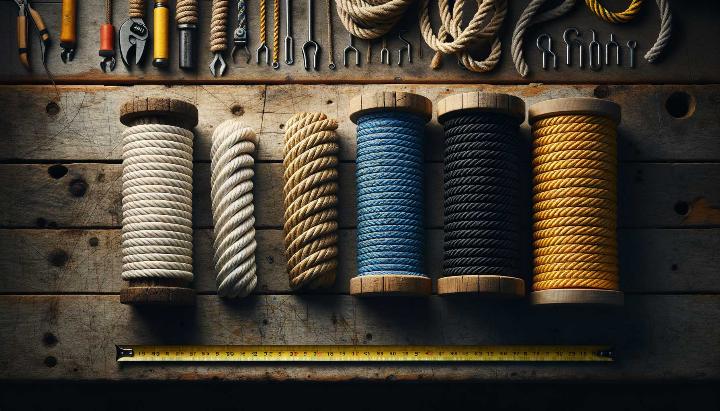Have you ever found yourself in a DIY predicament, wondering whether to reach for a polypropylene rope or a braided nylon twine? You're not alone. In the world of ropes and twines, choosing the right material can mean the difference between a successful project and a tangled mess.
At iRopes, we've seen countless customers grapple with this very dilemma. That's why we're diving deep into the world of polypropylene rope sizes and braided nylon twine sizes. Whether you're rigging a sailboat, securing a load, or embarking on a crafting adventure, understanding these versatile materials is crucial.
In this exploration, we'll unravel the mysteries behind polypropylene and braided nylon ropes, showcasing their unique properties and applications across various industries. From marine environments to construction sites, and even your own backyard, we'll demonstrate why these synthetic wonders have become the go-to choice for professionals and DIY enthusiasts alike.
So, grab a seat and prepare to be enlightened. By the end of this journey, you'll be equipped with the knowledge to choose the perfect rope for any situation, elevating your projects from ordinary to extraordinary. Let's dive in and discover the surprising world of synthetic ropes together!
Understanding Polypropylene Rope Sizes
When it comes to choosing the right rope for your project, size matters. Polypropylene rope, known for its versatility and durability, comes in a range of sizes to suit various applications. Let's dive into the world of polypropylene rope sizes and discover how to select the perfect one for your needs.
Diameter and Strength Correlation
Have you ever wondered why some ropes feel sturdier than others? The secret lies in their diameter. As a general rule, the thicker the rope, the stronger it is. But there's more to it than meets the eye.

I remember working on a boating project where we needed to choose between an 8mm and a 16mm polypropylene rope. The difference in strength was surprising – the 16mm rope could handle nearly four times the load of its 8mm counterpart!
Common Polypropylene Rope Sizes and Uses
Polypropylene rope sizes typically range from 4mm to 32mm in diameter. Here's a quick guide to help you understand their common applications:
- 4-6mm: Ideal for light-duty tasks like clotheslines or securing light loads.
- 8-12mm: Perfect for general-purpose use, including camping, gardening, and small watercraft.
- 16-24mm: Suitable for heavier marine applications, construction, and industrial use.
- 28-32mm: Used for heavy-duty industrial and marine applications where maximum strength is required.
When choosing a rope size, consider the intended use, required strength, and handling comfort. Remember, a thicker rope isn't always better – it's about finding the right balance for your specific needs.
Pro tip: Always check the manufacturer's specifications for the working load limit of the rope you're considering. This ensures you're using the rope safely within its capabilities.
Whether you're rigging a sailboat or securing a load on a truck, understanding polypropylene rope sizes is crucial for safety and efficiency. So next time you're browsing the rope aisle, you'll know exactly what to look for!
Exploring the Versatility of Braided Nylon Twine Sizes
As we dive deeper into the world of ropes and twines, let's turn our attention to the fascinating realm of braided nylon twine. This versatile material has found its way into countless applications, from delicate crafting projects to heavy-duty industrial uses. But what makes braided nylon twine so special, and how do you choose the right size for your needs? Let's unravel this mystery together.
Understanding Different Sizes and Applications
Braided nylon twine comes in a dizzying array of sizes, ranging from the whisper-thin #9 to the robust #180. But what do these numbers mean? Well, they're not just random digits - they actually correspond to the twine's diameter, which typically falls between 0.7 mm and 5.5 mm.
I remember the first time I encountered this sizing system at a local marine supply store. The shopkeeper patiently explained how the numbers related to strength and versatility. It was like unlocking a secret code!

To help you navigate this sizing system, here's a quick rundown of common sizes and their typical uses:
- #9 to #18: Ideal for delicate crafts, beadwork, and light fishing applications.
- #24 to #36: Perfect for general crafting, packaging, and medium-duty fishing tasks.
- #48 to #72: Suitable for heavier crafts, construction, and commercial fishing.
- #96 to #180: Used for industrial applications, heavy-duty construction, and large-scale commercial fishing operations.
Choosing the Right Twine for Your Project
Selecting the appropriate braided nylon twine size isn't just about picking the biggest or smallest option available. It's about finding that sweet spot where strength meets practicality. Here are some factors to consider:
- Load capacity: How much weight will the twine need to support?
- Environmental conditions: Will it be exposed to sun, water, or chemicals?
- Handling requirements: Do you need something easy to tie or manipulate?
- Visibility: Should the twine blend in or stand out?
For instance, when I was helping a friend set up his garden, we opted for a #36 braided nylon twine for trellising. It was strong enough to support the climbing plants but thin enough to be nearly invisible against the green foliage. The perfect balance!
Pro tip: When in doubt, it's often better to choose a slightly larger size than you think you'll need. It's always easier to work with a stronger twine than to risk a weaker one breaking under stress.
Remember, the versatility of braided nylon twine lies not just in its range of sizes, but in its inherent properties. Its braided construction offers superior strength and durability compared to twisted twines, while its nylon composition makes it resistant to abrasion, rot, and many chemicals. For detailed insights on its strength and resilience, you might be interested in exploring The Ultimate Guide to Braided Nylon Rope Advantages.
So, whether you're crafting delicate jewelry, securing a load on your truck, or rigging up fishing gear, there's a braided nylon twine size that's perfect for your project. Why not explore the possibilities and see where this versatile material can take your next endeavour?
Practical Applications of Polypropylene and Braided Nylon Ropes
As we dive deeper into the world of synthetic ropes, it's fascinating to see how polypropylene and braided nylon ropes have become indispensable in various industries. Their unique properties make them suitable for a wide range of applications, from marine environments to construction sites and even our own backyards. Let's explore the practical uses of these versatile materials and discover why they've become the go-to choice for professionals and DIY enthusiasts alike. For further exploration on polypropylene applications, check out our insights on Top Uses for Polypropylene Ropes in Various Industries.
Marine Uses for Polypropylene and Nylon Ropes
When it comes to marine applications, both polypropylene and nylon ropes shine in their own ways. I remember my first sailing trip, where I was amazed at how different ropes were used for various purposes on the boat. Here's why these materials are favoured in aquatic environments:
- Polypropylene's buoyancy is a game-changer for water-based activities. Its ability to float makes it perfect for marking buoys, creating safety lines, and even fashioning improvised life preservers in emergencies.
- Nylon's impressive strength-to-weight ratio makes it ideal for anchor lines and mooring ropes. Its natural elasticity absorbs shock from waves and tides, reducing strain on both the boat and the dock.

Have you ever wondered why fishing nets seem to last so long in harsh saltwater conditions? It's often because they're made from polypropylene, which resists degradation from salt and UV rays. On the other hand, nylon's superior abrasion resistance makes it the top choice for docking lines that frequently rub against rough surfaces. For more information on nylon's marine applications, visit our detailed guide on Exploring High-Performance Nylon and Braided Marine Ropes.
Industrial and Recreational Applications of Synthetic Ropes
Beyond the water's edge, polypropylene and nylon ropes find countless uses in both industrial and recreational settings. Let's break down some of their key applications:
- Construction sites rely on polypropylene ropes for temporary barriers and securing tarps due to their weather resistance and affordability.
- Rock climbing enthusiasts trust nylon ropes with their lives, thanks to the material's high tensile strength and ability to absorb energy from falls.
- Towing operations benefit from nylon's elasticity, which helps reduce the shock of sudden starts and stops when moving heavy loads.
I once visited a construction site where polypropylene ropes were being used to create a makeshift pulley system for moving materials. The site manager explained that the rope's lightweight nature made it easy to set up and adjust as needed throughout the day.
Pro tip: When using synthetic ropes for load-bearing applications, always check the manufacturer's specifications for working load limits and replace ropes regularly to ensure safety.
To help you choose the right rope for your project, here's a quick comparison of polypropylene and nylon properties:
| Property | Polypropylene | Nylon |
|---|---|---|
| Buoyancy | Floats | Sinks |
| Strength | Moderate | High |
| UV Resistance | Excellent | Good |
| Elasticity | Low | High |
| Abrasion Resistance | Good | Excellent |
Whether you're securing a load on a truck, setting up a campsite, or working on a DIY project at home, understanding the unique properties of polypropylene and nylon ropes can help you make the best choice for your specific needs. Remember, the right rope can make all the difference in the success and safety of your endeavour!
```htmlChoosing the right rope for your project is crucial, and polypropylene rope sizes and braided nylon twine sizes play pivotal roles in determining their suitability across various applications. Polypropylene ropes stand out for their versatility and strength, making them popular for tasks ranging from marina uses to industrial settings. Meanwhile, braided nylon twine, known for its durability, offers sizes to match diverse needs, from crafting to heavy-duty construction. Understanding each material's advantages and choosing the appropriate size ensures the right balance of strength and practicality for your needs.
Contact Us for Custom Rope Solutions
If you're looking to select the perfect rope for your specific projects, fill in the form above, and let us assist you with expert guidance and bespoke rope solutions tailored to your requirements.
```